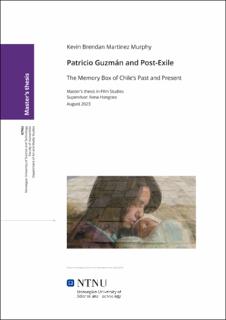| dc.contributor.advisor | Hongisto, Ilona | |
| dc.contributor.author | Martinez Murphy, Kevin Brendan | |
| dc.date.accessioned | 2023-09-23T17:20:57Z | |
| dc.date.available | 2023-09-23T17:20:57Z | |
| dc.date.issued | 2023 | |
| dc.identifier | no.ntnu:inspera:137202534:10709617 | |
| dc.identifier.uri | https://hdl.handle.net/11250/3091561 | |
| dc.description.abstract | Til tross for en stor samling litteratur dedikert til den chilenske dokumentarregissøren Patricio Guzmán har ikke hans siste «Chile trilogi» (Nostalgia for the Light [2010], The Pearl Button [2015], og The Cordillera of Dreams [2019]) mottatt like stor akademisk oppmerksomhet. I denne trilogien, utgitt over 20 år etter det chilenske diktaturets fall, er regissørens standhaftighet som en forkjemper for minne overskygget av representasjonen av vedvarende forskyvning (Displacement). Jeg argumenterer for at disse dokumentarene reflekterer et nytt stadiet i opplevelsen av eksil, noe jeg har valgt å kalle post-eksil, som kommer frem gjennom en post-eksil-estetikk. Mine mål med denne avhandlingen er dermed 1) å utrede post-eksil konseptet for å ta det i bruk som et analytisk verktøy. 2) Å analysere og reflektere over Chile trilogien som post-eksilfilm satt inn i konteksten av chilensk minnepolitikk. 3) Å ta del i og tilføye til eksisterende litteratur ved å sette i forgrunnen opplevelsen av uenighet mellom rom og tid (spatiotemporal dissonance) innvevd i post-eksil konseptet. Gjennom en næranalyse av disse filmene identifiserer jeg at post-eksilestetikken oppstår gjennom tre perspektiv. Et perspektiv der det chilenske landskapet er portrettert som både bokstavelig og metaforisk utøver og formidler av minne. Et mellomperspektiv dedikert til det chilenske folk der dannelsen av et nasjonalt historisk minne blir utfordret ved å fokusere på grupperinger, og individer deri, spesielt påvirket av diktaturet. Og et indre perspektiv der Guzmáns egen post-eksil opplevelse synliggjøres. Denne avhandlingen bidrar dermed til forskningen på chilensk eksilfilm. | |
| dc.description.abstract | Despite the large body of literature dedicated to the Chilean documentary filmmaker Patricio Guzmán, his latest “Chile trilogy” (Nostalgia for the Light [2010], The Pearl Button [2015], and The Cordillera of Dreams [2019]) has not received the same academic attention. Released over 20 years after the end of the Chilean dictatorship, the director’s persistence as a champion of memory is in these films nearly overshadowed by the representation of continued displacement. I argue that these documentaries reflect an evolved stage of the exilic experience, what I have deemed to call post-exile, which surfaces through a post-exilic aesthetic. My aims for this thesis are therefore to explicate the concept of post-exile in order to establish it as an analytical tool; analyze and reflect on the Chile trilogy as post-exile cinema in the context of Chilean memory politics; and engage with and expand upon existing literature by foregrounding the experience of spatiotemporal dissonance embedded in the concept of post-exile. Through a close reading of these films, I identify that the post-exilic aesthetic emerges through three layers of perspective: an outer layer wherein the Chilean landscapes are presented as both literally and metaphorically engaging with and conveying memory; a middle layer dedicated to the people of Chile, challenging the formation of a national historical memory by turning the attention on the groups especially affected by the dictatorship and the individuals therein; and an inner layer revealing Guzmán’s own post-exilic experience. This thesis thereby contributes to the research on Chilean exile cinema. | |
| dc.language | eng | |
| dc.publisher | NTNU | |
| dc.title | Patricio Guzmán and Post Exile: The Memory Box of Chile's Past and Present | |
| dc.type | Master thesis | |
